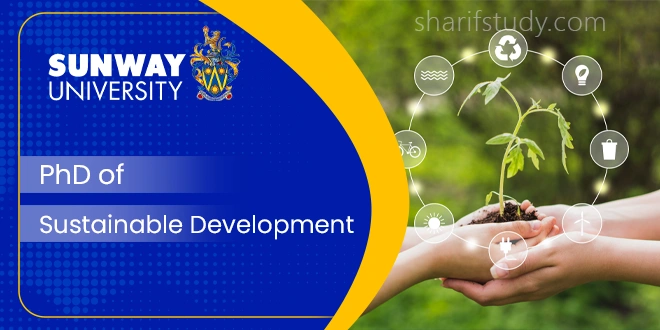The PhD in Sustainable Development is a comprehensive research program that focuses on important areas of sustainable development and topics specified in the 17 SDGs. The study themes will range from the science of climate change and ecosystems to sustainable economics, social advancement, management, public policies, environmental practices, and governance.
| Intakes |
Duration
|
| Rolling Intake | 3 Years (full-time) 4 Years (part-time) |
Program Overview
Sunway PhD of Sustainable Development Students can choose any of the main components of sustainable development and conduct deep study to create ideas, and practical solutions that will help in the advancement of the sustainability agenda.
Program Structure
Courses
Students enrolled in this PhD program by Research must finish a Research Methods course. This subject introduces students to postgraduate academic research and methodology in preparation for doing an independent research study.
Thesis
In the form of a thesis, Sunway PhD of Sustainable Development students must conduct extensive research on a topic connected to sustainable development. A proposal defense and viva voce are among the academic milestones that the student must achieve.
Area of Research
Economics and Sustainable Development
Economics and sustainable development focus on integrating economic growth with environmental concerns, aiming to achieve long-term economic stability without depleting natural resources.
This area explores strategies for reducing poverty and inequality while promoting environmental stewardship. It explores sustainable business models, green economies, and the role of economic policies in supporting sustainable practices. Research here is crucial for developing frameworks that balance economic development with ecological preservation.
Education Reform and Social Progress
Education reform and social progress in the context of sustainable development emphasize the importance of education in achieving societal sustainability goals.
This research area explores innovative educational policies and practices that foster environmental awareness, social responsibility, and critical thinking among students. It looks at how education can be a driving force for social change, promoting values and skills necessary for a sustainable future.
Sustainable Infrastructure, Transportation, and Mobility
This research area focuses on developing sustainable infrastructure solutions, particularly in transportation and mobility. It addresses the challenges of creating efficient, eco-friendly transportation systems that reduce carbon emissions and reliance on non-renewable energy sources.
Studies in this field explore advancements in public transport, urban planning, and technology integration to enhance sustainable mobility and accessibility.
Urban Sustainability
Urban sustainability research examines the development of cities in ways that do not compromise the needs of future generations. It involves studying sustainable urban planning, green building technologies, and the management of urban resources.
This area also explores how to maintain biodiversity, reduce waste, and improve air and water quality in densely populated areas, making cities more livable and environmentally friendly.
Corporate Strategies and Operations
This area investigates how businesses can operate sustainably, balancing profitability with social and environmental responsibility. It focuses on sustainable corporate strategies, including green supply chain management, sustainable resource utilization, and corporate social responsibility (CSR).
Research in this field helps companies implement practices that not only benefit the environment and society but also enhance long-term business success.
Public Policy and Sustainable Development
Public policy and sustainable development research examine the role of government policies in promoting sustainability. This area covers the formulation, implementation, and impact assessment of policies aimed at environmental protection, economic growth, and social equity. It involves understanding the interplay between different policy instruments and sustainable development goals, ensuring that public policies effectively contribute to a sustainable future.
Solid and Hazardous Waste Management
Research in solid and hazardous waste management focuses on methods and technologies for effectively managing waste, reducing environmental impacts, and promoting recycling and resource recovery. It encompasses the study of waste treatment, disposal, and minimization strategies, as well as the development of policies and regulations for hazardous waste handling. This area is crucial for achieving sustainable waste management systems and reducing pollution.
Political Institutions, Group Conflicts, and Democracy
This field explores the relationship between political institutions, group conflicts, and democracy within the sustainable development context. It investigates how political structures and processes can be designed to address environmental challenges, manage group conflicts, and promote democratic governance. Research in this area is key to understanding how political stability and inclusive governance contribute to sustainable development.
Climate Change Adaptations
Climate change adaptations research focuses on developing strategies to cope with the impacts of climate change. This includes studying the effects of climate change on different regions and sectors, and developing adaptive responses to mitigate these impacts. Research in this field is crucial for guiding communities, governments, and organizations in adjusting to changing climate conditions, minimizing risks, and enhancing resilience.
Renewable Energy
Renewable energy research is dedicated to developing sustainable energy sources to replace fossil fuels. It involves exploring solar, wind, hydro, and bioenergy technologies, and their integration into the energy grid. This area also examines the economic, environmental, and social implications of transitioning to renewable energy sources. Research here is fundamental for advancing energy sustainability and combating climate change.
Entry Requirements
General Requirements
Candidates should have one of the following qualifications:
- A Master’s Degree in a related field as accepted by the University Senate; OR
- Other qualifications equivalent to a Master’s degree as accepted by the University Senate.
English Requirements
International candidates must demonstrate English ability sufficient to satisfy the program’s requirements:
- IELTS 6.0
- TOEFL 550 (paper-based), 213 (computer-based), 80 (internet-based)
- PTE Academic 50 overall (minimum 46 in each skill)
- OR Medium of instruction should be English at undergraduate and Master’s level.
Note: Candidates who have completed a Bachelor’s degree or equivalent in English would have met the language requirement.
Career Options
- Academia
- Government
A PhD in Sustainable Development can lead to great career opportunities in both academia and government. In academia, you can become a university professor or a researcher, helping to educate others and explore new ideas in sustainability. This path is perfect for those who love learning and sharing knowledge.
In government, your skills are useful for helping to make policies and plans that protect the environment. You could work as a policy advisor or an environmental analyst, where you help guide decisions to make sure they are good for the planet. Both these career paths are rewarding and let you make a big difference in making the world more sustainable.
FAQs
1. What is the focus of the Sunway PhD of Sustainable Development?
- This program is designed to develop experts who can contribute to the field of sustainable development through innovative research. It focuses on addressing global challenges related to environmental sustainability, economic stability, and social equity.
2. What support does Sunway University provide to PhD students?
- The university offers comprehensive support, including academic mentoring, professional development workshops, and mental health services to ensure students achieve their research goals and maintain well-being.
Program Fees
Sunway PhD of Sustainable Development fees are annually. International students have different rates, considering extra resources provided. following table shows annual fees for the program.
| Malaysian Students | International Students |
| RM59,980 | USD14,330 |
International students must pay their fees in RM equivalent. The USD here is just an indicative/estimation and subject to the prevalent exchange rate.
 SharifStudy Best way to Study in Malaysia
SharifStudy Best way to Study in Malaysia




